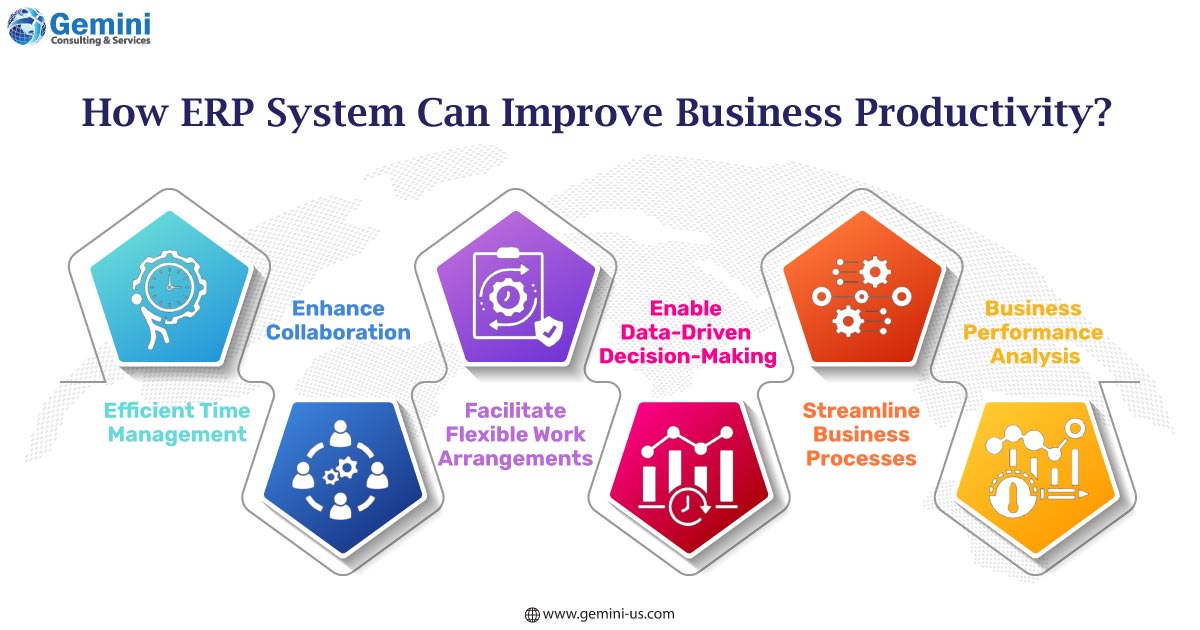Enterprise Resource Planning (ERP) solutions play a pivotal role in enhancing business expansion and optimizing productivity. They contribute to increased employee engagement, providing various avenues for empowerment. Beyond efficiently managing business operations, an ERP system offers increased flexibility in their roles to employees.
In any organization, regardless of its size, functional divisions define its structure, encompassing administration, sales, finance, customer service, HR, production, and more. Historically, these departments operated as isolated entities with limited real-time interaction. The advent of modern ERP solutions has revolutionized this landscape, facilitating streamlined business processes and instantaneous communication across departments.
Let’s explore the ways an ERP system can improve overall business productivity and mitigate disruptions across the organizational spectrum.

- Efficient Time Management
Productivity can decline when employees spend a significant portion of their workday manually inputting data into Excel sheets or engaging in other repetitive, error-prone tasks. ERP system automates routine processes, allowing employees to simply update or input new data into a shared system. By eliminating unnecessary manual operations, employees gain more time to focus on urgent, time-sensitive projects. - Enhance Collaboration
Corporate decisions are often driven by company owners, managers, or C-level executives, but gaining employee trust can be challenging when decisions are made without their input. An ERP solution involves employees and system users in decision-making, removing guesswork from crucial business choices. It helps employees understand their roles better and quickly identifies redundant processes that can be streamlined. - Enable Data-Driven Decision-Making
Effective departmental collaboration is vital for overall company success. Through automated processes, an ERP system consolidates and updates information, making it easily accessible. When employees across different levels have real-time, accurate data at their disposal, they can make informed decisions with confidence, ensuring a positive outcome. - Facilitate Flexible Work Arrangements
With the prevalence of remote work, an ERP system, particularly a cloud-based one, offers complete functionality on desktops, laptops, or mobile devices, accessible from anywhere at any time. This empowers remote personnel to work independently while remaining integral to the company’s operations. - Streamline Business Processes
As organizations expand, complexities in operations tend to increase. ERP systems provide a centralized source of truth, gathering relevant information, ensuring transparency across departments, and breaking down organizational barriers. Adopting industry best practices, ERP systems bring significant benefits by implementing tried-and-true processes and establishing a standardized system. - Business Performance Analysis
Managers can use ERP to monitor staff and project progress, ensuring timely achievement of deadlines and benchmarks. Continuous project monitoring highlights and addresses critical issues, reducing the risk of project failures and enhancing overall productivity. ERP enables businesses to set and track operational goals, targets, and deadlines at both individual and departmental levels, promoting productivity throughout the organization.
How ERP Benefits Employees?
Enterprise Resource Planning (ERP) plays a crucial role in enhancing employee performance and overall organizational efficiency. By providing real-time information on sales and evaluating pending tasks, ERP promotes transparency and empowers employees to manage their work effectively, ensuring tasks are completed within designated timelines. This transparency also allows administrators to distribute work equitably among employees, fostering a sense of fairness and reducing work-related stress.
To address the challenges businesses face, it is essential to choose an ERP solution tailored to specific industry needs. Gemini Consulting & Services offers expertise in identifying and resolving challenges through ERP implementation, ensuring long-term benefits when executed correctly. Contact us for assistance in deploying a suitable ERP system for your enterprise.
When selecting an ERP solution, businesses should carefully consider industry-specific requirements, essential ERP aspects, and the choice between on-premise or cloud-based systems. This thoughtful approach helps in finding the right ERP partner to guide through the implementation process. Maintaining a strong relationship with the ERP partner is crucial for ongoing success, emphasizing the importance of selecting providers with optimal solutions and implementation approaches.

Change Management & Training Employees
Effective change management is paramount during ERP implementation. Mapping out changes and addressing potential issues beforehand ensures a smooth adoption process. Constant communication and comprehensive training sessions before and during implementation enable employees to fully grasp the benefits of ERP at every stage.
Employee collaboration is another key aspect of successful ERP implementation. Involving the team in the process allows them to identify areas that can be automated or require unique customizations, tailoring the ERP system to the specific needs of the organization.
Understanding the complexity of ERP systems, companies must invest in thorough training programs to ensure employees comprehend their roles within the system. Providing training sessions on business processes not only enhances productivity and efficiency but also reduces frustration stemming from unresolved issues. The advantages of ERP training include improved employee productivity and efficiency, reduced training costs, enhanced customer service, maximized sales and profits, and increased employee morale.
In conclusion, ERP plays a pivotal role in benefiting employees by promoting transparency, equitable workload distribution, and effective training programs, ultimately contributing to enhanced organizational performance.



